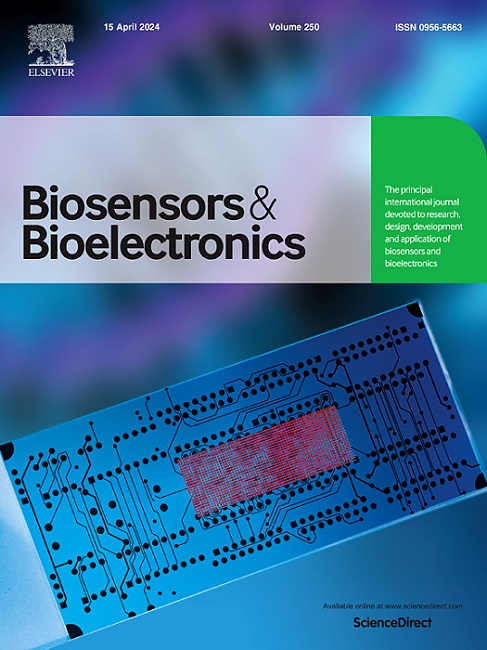Bridging basic science and applied diagnostics: Comprehensive viral diagnostics enabled by graphene-based electronic biosensor technology advancements
IF 10.7
1区 生物学
Q1 BIOPHYSICS
引用次数: 0
Abstract
This study presents a graphene field-effect transistor (gFET) biosensor with dual detection capabilities for SARS-CoV-2: one RNA detection assay to confirm viral positivity and the other for nucleocapsid (N-)protein detection as a proxy for infectiousness of the patient. This technology can be rapidly adapted to emerging infectious diseases, making an essential tool to contain future pandemics. To detect viral RNA, the highly conserved E-gene of the virus was targeted, allowing for the determination of SARS-CoV-2 presence or absence using nasopharyngeal swab samples. For N-protein detection, specific antibodies were used. Tested on 213 clinical nasopharyngeal samples, the gFET biosensor showed good correlation with RT-PCR cycle threshold values, proving its high sensitivity in detecting SARS-CoV-2 RNA. Specificity was confirmed using 21 pre-pandemic samples positive for other respiratory viruses. The gFET biosensor had a limit of detection (LOD) for N-protein of 0.9 pM, establishing a foundation for the development of a sensitive tool for monitoring active viral infection. Results of gFET based N-protein detection corresponded to the results of virus culture in all 16 available clinical samples and thus it also proved its capability to serve as a proxy for infectivity. Overall, these findings support the potential of the gFET biosensor as a point-of-care device for rapid diagnosis of SARS-CoV-2 infection and indirect assessment of infectiousness in patients, providing additional information for clinical and public health decision-making.
连接基础科学与应用诊断:基于石墨烯的电子生物传感器技术进步带来的综合病毒诊断技术
本研究介绍了一种具有双重检测功能的石墨烯场效应晶体管(gFET)生物传感器,用于检测 SARS-CoV-2 病毒:一种是用于确认病毒阳性的 RNA 检测方法,另一种是用于检测核头壳(N-)蛋白,作为患者传染性的替代指标。该技术可迅速适应新出现的传染病,是遏制未来流行病的重要工具。为了检测病毒 RNA,我们以高度保守的病毒 E 基因为目标,利用鼻咽拭子样本确定是否存在 SARS-CoV-2 病毒。在检测 N 蛋白时,使用了特异性抗体。在对 213 份临床鼻咽样本进行测试后,gFET 生物传感器与 RT-PCR 周期阈值显示出良好的相关性,证明了它在检测 SARS-CoV-2 RNA 方面的高灵敏度。使用 21 份对其他呼吸道病毒呈阳性的疫前样本证实了其特异性。gFET 生物传感器对 N 蛋白的检测限(LOD)为 0.9 pM,为开发监测病毒感染活动的灵敏工具奠定了基础。基于 gFET 的 N 蛋白检测结果与所有 16 份临床样本的病毒培养结果一致,因此也证明了它有能力作为感染性的替代物。总之,这些研究结果支持了 gFET 生物传感器作为快速诊断 SARS-CoV-2 感染和间接评估患者传染性的床旁设备的潜力,为临床和公共卫生决策提供了更多信息。
本文章由计算机程序翻译,如有差异,请以英文原文为准。
求助全文
约1分钟内获得全文
求助全文
来源期刊

Biosensors and Bioelectronics
工程技术-电化学
CiteScore
20.80
自引率
7.10%
发文量
1006
审稿时长
29 days
期刊介绍:
Biosensors & Bioelectronics, along with its open access companion journal Biosensors & Bioelectronics: X, is the leading international publication in the field of biosensors and bioelectronics. It covers research, design, development, and application of biosensors, which are analytical devices incorporating biological materials with physicochemical transducers. These devices, including sensors, DNA chips, electronic noses, and lab-on-a-chip, produce digital signals proportional to specific analytes. Examples include immunosensors and enzyme-based biosensors, applied in various fields such as medicine, environmental monitoring, and food industry. The journal also focuses on molecular and supramolecular structures for enhancing device performance.
 求助内容:
求助内容: 应助结果提醒方式:
应助结果提醒方式:


